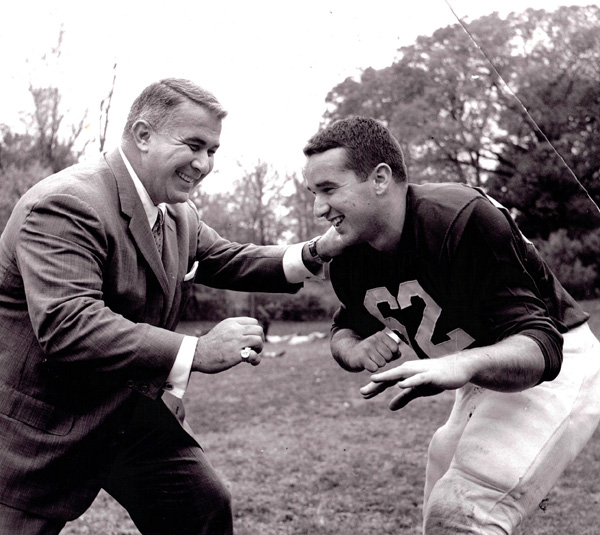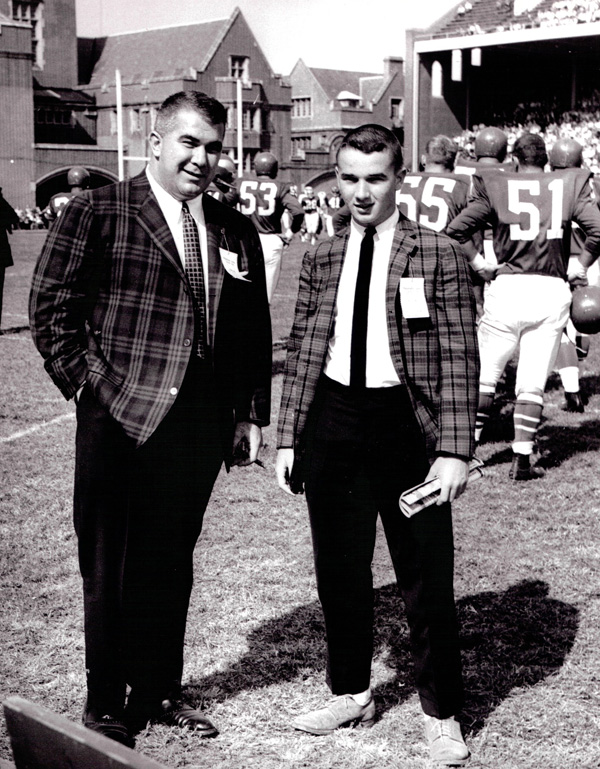Play to Pay: Football Helps Fund an Education
By Jon Caroulis
America faced many shortages during World War II: sugar, gasoline, even offensive linemen. The Philadelphia Eagles needed a guard in 1944, and there weren't many available. That's when two-way player, and later assistant coach, Bucko Kilroy told Head Coach Greasy Neale, "What you need is in a classroom on Broad Street." He was referring to Michael Mandarino, a childhood friend who was entering the third year of his medical school education at Hahnemann.

Mandarino was a "Little All American" while he played for La Salle College, and when the Eagles called, it was an offer he couldn't pass up.
The money he earned from playing with the Eagles ($200 a game) helped pay Mandarino's Hahnemann tuition, says his son, Michael Mandarino, Jr., MD, a 1972 Hahnemann graduate.
The senior Mandarino was taking classes at Hahnemann daily from 8 a.m. to 5 p.m. "Back then, everybody on the team had a day job, so they practiced under the lights from 6 p.m. to 9 p.m.," the son explains.
"In the 1945 Eagles team picture, my father is sitting there, and he looks like a kid on Christmas morning," says Mandarino Jr. "He was having the time of his life. He had everything he loved — medicine and football."
While Mandarino loved playing, he was always serious about his medical education, says his son. There's a photograph of the team traveling on an airplane, he says, and everyone is laughing and having fun, but his father is reading a textbook.
Hahnemann students back then had to be on call for weekends, and they were paid $25. When it was Mandarino's turn to work the weekend, he traded his on-call duty to other students: they got extra money, and Mandarino was free to play football.
During one season, Coach Neale told Mandarino to play tackle after their starter was injured. Neale said, "If you are smart enough to be a doctor, you are smart enough to learn two sets of plays." The following week, both Eagles centers were injured, so Neale told Mandarino that he "should be smart enough to learn three sets of plays," and he played center.

NEW TEAMS AND POSITIONS
Because of the war, medical students went year-round and graduated in three years. Mandarino graduated in 1945, just as the war was ending. After he began his orthopedic surgery residency at Hahnemann, he played for the Eagles' minor league team in Wilmington, Del., under an assumed name.
When the Korean War broke out, Mandarino was called into the Army Air Force. He spent two years as chief of orthopedics at Sampson Air Force Base in Geneva, N.Y., where he treated practically every soldier who needed orthopedic care, says his son. When his tour was up, the Army, using the "emergency" powers prompted by the war, extended his service another year.
From 1953 until 1962, Mandarino served as team physician and orthopedic consultant for the Eagles. In 1954, he received his certification from the American Board of Orthopedic Surgeons. In 1956, he became a fellow of the American Academy of Orthopedic Surgeons.
THE FUTURE IN PLASTICS
In the late 1950s, Mandarino became famous for developing the use of a polyurethane polymer to repair fractured and diseased bones. Called Ostamer (then a trademark of the William S. Merrell Company), the rigid polyurethane foam could be poured in liquid form. Mandarino presented a report on 35 cases at the 1959 American Medical Association annual meeting and subsequently published several articles on the Ostamer technique.
"He read an article in Time magazine about how airplane wings were attached to the body of the plane with a plastic substance. He figured, if it could keep wings on an airplane while in flight, it could keep broken bones together," says Mandarino Jr. Ostamer, he points out, "is the forerunner of what's being used today."
Mandarino Jr. also played college football, when he was an undergraduate at the University of Pennsylvania. He says his father (who died in 1985) was his inspiration to attend Hahnemann and to become an orthopedic doctor. "I was born at Hahnemann, I did my residency there, my wife [Terry L. Mandarino, RN, HU '69] went there," he says. "I guess I'm a Hahne-maniac."
And like his father, he treats athletes.
Back to Top